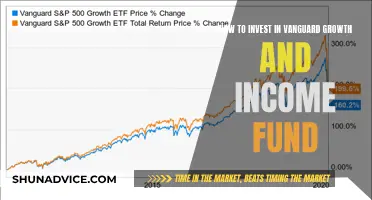
Mutual funds are a great way to grow your money and achieve your financial goals. They are an investment vehicle where multiple investors pool their funds, which are then managed by professionals and invested across various asset classes. When choosing a mutual fund to invest in, it is important to consider your financial goals, risk tolerance, and investment horizon. Here are some key factors to keep in mind when deciding which mutual fund scheme is best for you:
- Investment goals: Are you investing for retirement, saving for a specific purchase, or looking for capital appreciation? Different mutual funds have different investment objectives, so it's important to choose one that aligns with your goals.
- Risk tolerance: Mutual funds can vary in terms of risk, from conservative to aggressive. It's important to consider your risk tolerance and choose a fund that matches your comfort level.
- Investment horizon: How long do you plan to invest for? Mutual funds typically perform better over the long term, and short-term investments may be subject to higher fees and charges.
- Fees and expenses: Mutual funds come with various fees, such as expense ratios, sales loads, and management fees. It's important to understand the fee structure of a fund before investing, as these fees can eat into your returns.
- Fund performance: While past performance does not guarantee future results, it can give you an idea of how the fund has performed over time. Look at the fund's historical returns over different time periods to get a sense of its consistency.
- Diversification: Mutual funds offer instant diversification by investing in a variety of assets, sectors, or geographic regions. Consider your current portfolio and choose a fund that helps diversify your investments.
- Fund ratings: Reputable financial institutions often provide ratings for mutual funds based on their performance, risk, and other factors. These ratings can give you an idea of the quality and potential of a particular fund.
- Minimum investment: Different mutual funds have different minimum investment requirements. Make sure you are comfortable with the minimum investment amount before committing to a fund.
- Brokerage account: You will need a brokerage account to invest in mutual funds. Compare different brokers and consider factors such as affordability, fund choices, research tools, and ease of use before opening an account.
Remember, it's important to do your own research and consult with a financial advisor before making any investment decisions.
| Characteristics | Values |
|---|---|
| Definition | A mutual fund is formed when an asset management company (AMC) pools money from several individual and institutional investors to purchase securities such as stocks, debentures and other similar assets. |
| Net Asset Value (NAV) | The Net Asset Value (NAV) is the market price of all the securities that a mutual fund scheme currently holds. Investors are allowed to purchase or redeem fund units only at the prevailing net asset value (NAV). |
| Types | Equity Funds, Debt Funds, Hybrid Funds, Solution Oriented Funds and other schemes (Index Funds and Funds of Funds) |
| Equity Funds | Invest at least 65% of their assets in equity and equity-related instruments. |
| Debt Funds | Invest in fixed income instruments like bonds, government securities, and money market instruments. |
| Hybrid Funds | Invest in a mix of equity and debt instruments. |
| Solution Oriented Funds | Designed to provide specific financial goals like retirement planning and children's education. |
| Index Funds | Track a specific market index, like the Nifty or Sensex, and aim to replicate its performance. |
| Who Should Invest | A variety of investors, offering a wide range of options to suit different financial goals, risk tolerances, and investment horizons. |
| Risk | The risk level of mutual funds varies across types as it directly depends on the underlying assets. |
| Taxation | Mutual funds in India are subject to different taxation rules based on the type of mutual fund and the holding period. |
What You'll Learn

Large-cap mutual funds
Large-cap funds are ideal for investors seeking steady returns with relatively lower risk. When compared to small-cap and mid-cap funds, large-cap funds tend to pose less risk and are perfect for risk-averse investors. The Net Asset Value (NAV) fluctuations are relatively small, and these funds are known to withstand bear markets.
When considering large-cap mutual funds, it is essential to evaluate the investment risks, expense ratios, and investment horizons. Large-cap equity funds are subject to market risks, but these tend to be moderate. The expense ratio, or management fee, impacts the overall profits, so a lower expense ratio is preferable. In terms of investment horizon, large-cap funds are best suited for those investing for the medium to long term, ideally for at least three to five years, to maximize the potential for returns.
Some of the top-performing large-cap funds in recent years include the Nippon India Large Cap Fund, ICICI Prudential Bluechip Fund, Canara Robeco Bluechip Equity Fund, and Invesco India Largecap Fund.
Bond Fund Strategies: Dynamic Investing for Maximum Returns
You may want to see also

Mid-cap mutual funds
When considering mid-cap mutual funds, it is essential to evaluate the fund's performance, risk, and investment strategy. Here are some of the top-performing mid-cap growth funds, along with some key details:
- IShares S&P Mid-Cap 400 Growth ETF: This fund has a Morningstar Medalist Rating of Silver and a four-star Morningstar Rating. It outperformed the average fund in the mid-cap growth category with a 23.43% gain over the past year.
- Principal MidCap Fund: This actively managed fund has a Morningstar Medalist Rating of Gold and a five-star Morningstar Rating. It outperformed the average mid-cap growth fund with a 21.92% return over the past year and has consistently strong performance over three and five-year periods.
- SPDR S&P 400 Mid Cap Growth ETF: With a Morningstar Medalist Rating of Silver and a four-star Morningstar Rating, this passively managed fund saw a 23.41% gain over the past year, outperforming the average fund in its category.
- Vanguard S&P Mid-Cap 400 Growth Index Fund: This passively managed fund has a Morningstar Medalist Rating of Silver and a four-star Morningstar Rating. It rose 23.45% over the past year and has outperformed its peers over three and five-year periods.
- Virtus KAR Small-Cap Core Fund: This actively managed fund has a Morningstar Medalist Rating of Silver and a five-star Morningstar Rating. It outperformed the average mid-cap growth fund with a 20.48% return over the past year and has strong five-year performance.
In addition to the above-mentioned funds, here are some other notable mid-cap mutual funds:
- T. Rowe Price Instl Mid-Cap Eq Gr Fd
- Fidelity® Growth Strategies Fund
- T. Rowe Price Diversified Mid Cap Gr Fd
- Federated Hermes MDT Mid Cap Growth Fund
- Motilal Oswal Midcap Fund
- Edelweiss Mid Cap Fund
- Nippon India Growth Fund
- HDFC Mid-Cap Opportunities Fund
When considering mid-cap mutual funds, it is important to remember that past performance does not guarantee future results. It is essential to evaluate your investment goals, risk tolerance, and time horizon before making any investment decisions. Diversification and a long-term perspective are key to successful investing.
Private Equity Funds: Impact Investing Strategies Revealed
You may want to see also

Small-cap mutual funds
When considering small-cap mutual funds, it is important to assess your risk tolerance and investment goals. These funds are ideal for investors seeking long-term capital growth and are willing to accept higher risks for the potential of significant returns. Additionally, small-cap funds can provide diversification to an investment portfolio, as they focus on emerging companies across various sectors, including financial institutions, IT, and automotive.
Some popular small-cap mutual funds in the Indian market include:
- Nippon India Small Cap Fund
- Quant Small Cap Fund
- Invesco India Smallcap Fund
- Bank of India Small Cap Fund
- Edelweiss Small Cap Fund
- Canara Robeco Small Cap Fund
- Franklin India Smaller Companies Fund
- Tata Small Cap Fund
It is important to note that investing in small-cap mutual funds carries certain limitations and risks. These funds have higher price volatility and a longer investment horizon. Small-cap companies may also choose to reinvest their earnings instead of paying dividends, which can make stable returns more difficult to achieve. Therefore, it is advisable for investors to conduct thorough research and carefully consider their investment strategies before allocating their funds to small-cap mutual funds.
Emerging Markets: Where to Invest and Why
You may want to see also

Multi-cap mutual funds
Multi-cap funds are ideal for investors seeking a diversified portfolio without having to purchase different funds. They are suitable for first-time investors as they keep the risk in control and are ideal for those with a long-term investment horizon of more than five years. Additionally, multi-cap funds are a good choice for investors who want exposure to mid and small-cap stocks without taking on too much risk.
When considering multi-cap mutual funds, it is important to be aware of the expenses and risks involved, as well as the fund's historical returns, NAV, AUM, and the performance of fund managers. The investment horizon for multi-cap funds should be at least five years to balance out the volatility of equity markets and reap the benefits of compounding.
Some of the top-performing multi-cap mutual funds in India include:
- Nippon India Multi Cap Fund
- Mahindra Manulife Multi Cap Fund
- ICICI Prudential Multicap Fund
- Invesco India Multicap Fund
- Sundaram Multi Cap Fund
- Aditya Birla Sun Life Multi-Cap Fund
- Bandhan Multi Cap Fund
- Motilal Oswal Multi Cap Fund
The Future of Investing: Funds to Focus On
You may want to see also

Focused mutual funds
Advantages of Focused Mutual Funds
High Potential Returns
A diversified equity fund typically has positions in many companies to minimise risk exposure, but this can result in lower returns, especially in a polarised market where only a few stocks outperform. In contrast, focused funds deploy capital only in select stocks, which are typically high-conviction bets that a fund manager believes will perform well.
Diversification Across Company Sizes
Focused funds have the freedom to invest in companies of any market capitalisation. This means they can invest in small cap, mid cap and large cap companies, and they can change this split according to market conditions. This results in a portfolio that is both diversified across market caps and flexible.
Exposure to Handpicked Stocks
As focused funds can invest in a maximum of 30 companies, fund managers spend a lot of time and effort selecting these stocks. This in-depth assessment helps ensure that only the best-performing stocks make it into the portfolio, giving investors the chance to earn better returns than the broader stock market.
Who Should Invest in Focused Mutual Funds?
Investors Who Have an Appetite for Risk
Focused funds come with a relatively higher risk due to the limited number of stocks in their portfolio. The fund manager bets on stocks that they believe will provide high returns, but this concentration means that even one unsuccessful bet can lead to substantial losses.
Investors With Some Investing Experience
Focused funds may not be suitable for beginners as they can be more volatile than multi-cap funds in the short to medium term.
Investors With at Least a 5-Year Investment Horizon
Focused funds are equity funds, so they need to be held for at least five years to show their true potential. In addition, these funds take selective bets, and those bets might take time to show results.
Things to Consider Before Investing in Focused Mutual Funds
Risk
Focused funds run a concentrated portfolio with a maximum of 30 stocks. As they have to deploy their entire fund across a handful of stocks, they are not truly diversified, which is the source of risk in these funds. The risk is higher than in diversified mutual funds like multi-cap funds.
Returns
Focused funds can beat diversified funds and broader markets in polarised markets, where a select group of stocks drives market growth while the majority of listed stocks don't grow. However, if the market rally is more broad-based, then returns might not justify the risk taken.
Cost
Look out for funds with low expense ratios, as this means your take-home returns will be higher.
Investment Horizon
Focused funds can experience volatility in the short term due to their concentration in a limited number of stocks. Therefore, they may not be suitable for short-term investments.
Tax Implications on Focused Mutual Funds
The taxation on focused funds is similar to that of other equity funds. If you hold your investments for more than a year, gains will be classified as Long-Term Capital Gains (LTCG) and taxed at 10 per cent, as long as total gains during the year exceed ₹1 lakh. If you sell your holding within a year, your Short-Term Capital Gains (STCG) tax will be taxed at 15 per cent.
U.S. Investment Fund Transition to Schwab: What, When, Why?
You may want to see also
Frequently asked questions
Mutual funds are a smart way to grow your money. They are professionally managed, highly liquid, and historically have had higher returns than other traditional investment options. They are also regulated by the SEBI, ensuring transparent processes and protection for investors.
There is no one-size-fits-all answer. You need to consider your risk tolerance and investment horizon. Choose a fund that aligns with your risk appetite and time horizon. Additionally, look at the fees associated with the fund, as high fees can eat into your returns.
While there is no definitive list, here are some top-performing Mutual Funds as of September 2024:
- Fidelity Select Semiconductors
- Fidelity Series Growth Company
- Fidelity Select Technology
- Vanguard Wellington Fund
- Fidelity 500 Index







